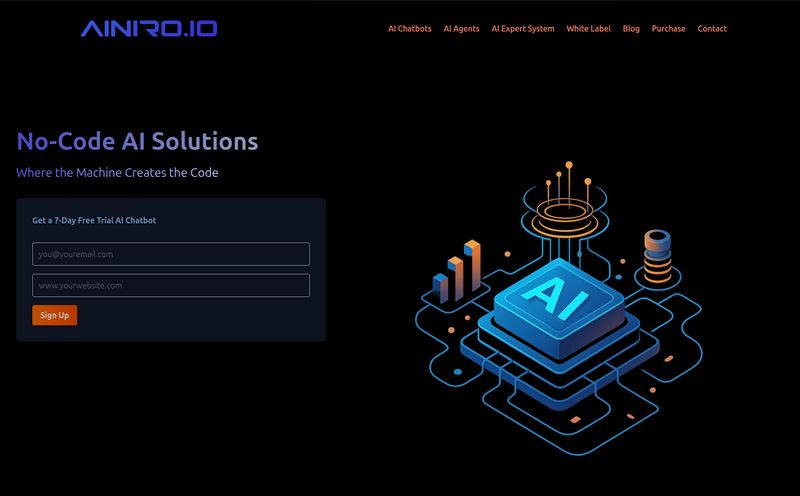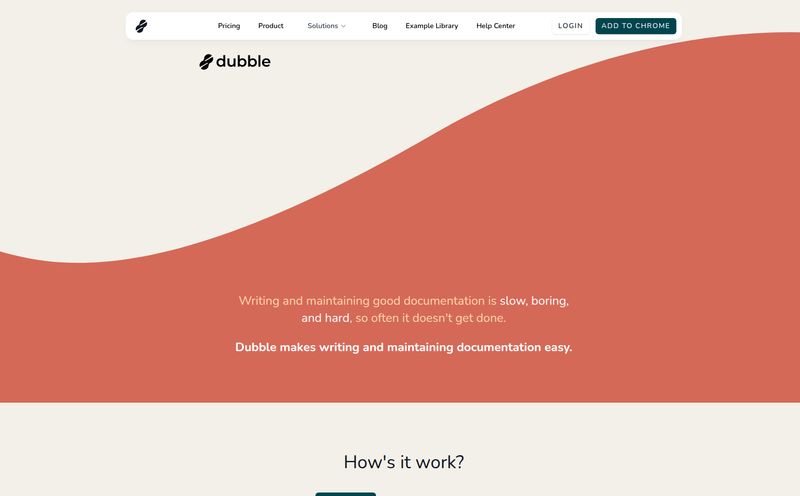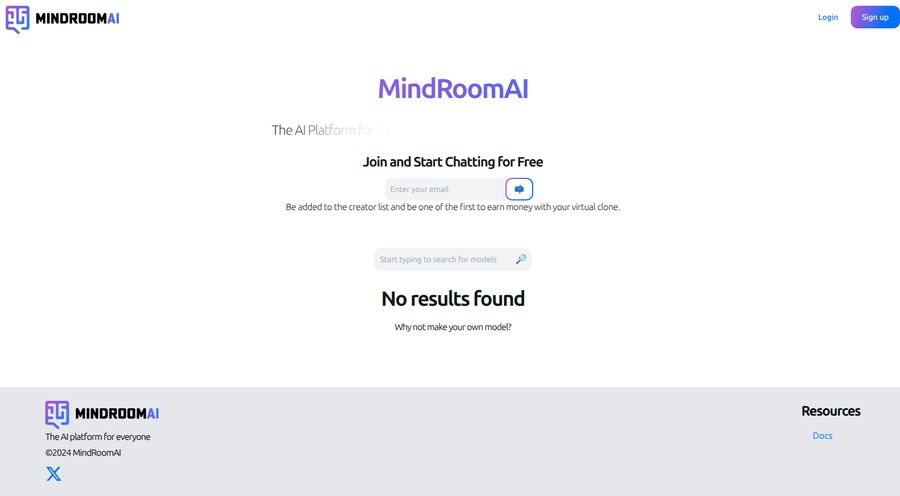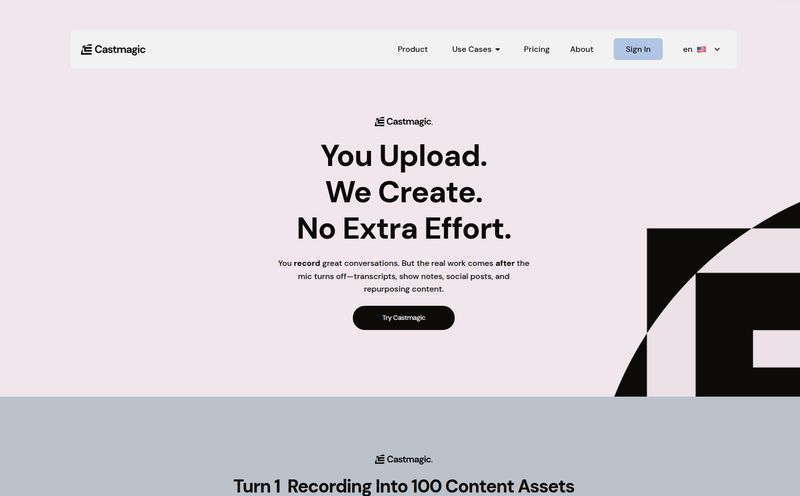If you're in any field that requires serious research—academia, legal, corporate R&D, heck, even just being a very dedicated hobbyist—you know the pain. That feeling of staring at a folder containing 57 different PDFs, all dense, all critical, and knowing you have to somehow absorb the key information from every single one. It’s like being told to drink from a firehose.
I remember my university days, surrounded by stacks of research papers that were slowly forming their own geological strata on my desk. My 'system' involved a rainbow of highlighters, a mountain of sticky notes, and a whole lot of caffeine-fueled desperation. The idea of actually talking to my documents and getting straight answers? Pure science fiction.
Well, the future is officially here, and it's less about flying cars and more about making our digital lives less of a headache. I’ve been playing around with a tool called Petal, and I have to say, it’s one of the few things in the AI space lately that feels genuinely useful, not just a novelty. It's built on a simple, powerful premise: what if you could just ask your documents questions?
So, What Exactly is Petal?
In the simplest terms, Petal is an AI-powered platform that lets you upload your documents and then have a conversation with them. Think of it less like a search engine that scours the whole web and more like a brilliant, hyper-focused research assistant who has perfectly memorized every single word of your trusted material. You upload your research papers, legal contracts, or financial reports, and Petal becomes an expert on that content. Instantly.
And you can tell it's geared toward serious work. When you see names like Caltech, MIT, Intuit, and Indeed listed as trusting the platform, you know it’s not just for summarizing your favorite cookie recipes. This thing is built for heavy-duty knowledge work.
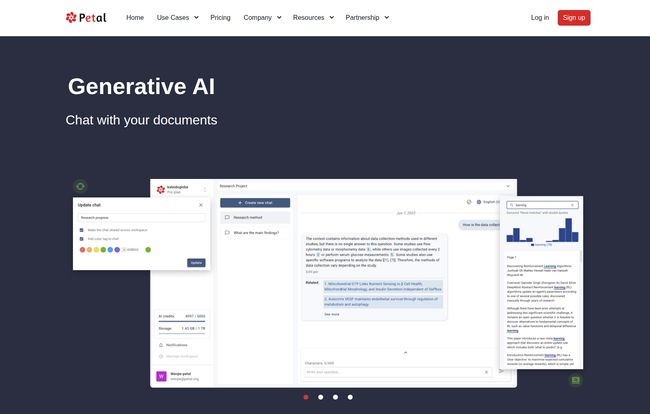
Visit Petal
The magic isn't just that it finds information; it's how it finds it. The answers are sourced directly from the documents you provide. This is a huge deal. It dramatically reduces the risk of AI 'hallucinations'—you know, when a chatbot confidently makes something up. With Petal, if the answer isn't in your docs, it won't invent one. For anyone whose work depends on accuracy, that's everything.
The Features That Actually Matter
A lot of software tools love to boast about a long list of features, but most of them end up being digital dust collectors. With Petal, a few core functions do all the heavy lifting, and they do it incredibly well.
Chatting with Your Docs: The Main Event
This is the star of the show. You drop a document into your Petal cloud drive and the conversation can begin. It's shockingly intuitive. You can ask things like:
What was the methodology used in this study?
Summarize the key findings from section 3.
Are there any mentions of 'market volatility' in this financial report?
But the real power move is the multi-document chat. This is available on the higher-tier plans (or as a 7-day trial on the free one), and it’s what sets Petal apart from simpler tools. You can select multiple sources and ask questions across all of them. Imagine having five different studies on the same topic and asking,
Compare the conclusions of these five papers regarding patient outcomes.
The time savings are just astronomical. What would have taken hours of painstaking, side-by-side reading now takes seconds.
Beyond Chat: Summaries, Translations, and Collaboration
While the chat is the main draw, Petal isn't a one-trick pony. It can generate summaries of entire documents, which is perfect for getting the gist of a long report before you commit to a deep read. It can also explain complex paragraphs in simpler terms or even translate text. It’s all part of making dense information more accessible.
Then there's the collaboration side. You can annotate documents and share them with team members or guests. No more emailing PDFs back and forth with confusing notes like "see my comment on page 17, paragraph 3." All the discussion happens right there on the document, creating a single source of truth for your team's feedback and analysis.
The Multi-Document AI Table: A Researcher's Dream
Okay, this feature is just plain cool. The AI Table lets you compare information across multiple documents in a structured way, using natural language. For instance, you could select several company reports and ask it to "Create a table showing the CEO, annual revenue, and number of employees for each company." Petal will scan the documents and generate a neat table with the requested data. It’s like creating a custom database on the fly, just by asking for it. This is an absolute beast for competitive analysis or literature reviews.
My Honest Take: The Good, The Bad, and The "Hmm..."
After using Petal for a while, I've got some pretty solid feelings about it. No tool is perfect, right? Here’s my no-fluff breakdown.
The good stuff is obvious. The time-saving aspect is phenomenal. It fundamentally changes the drudgery of research into a more dynamic process of inquiry. The accuracy and the fact that it cites its sources within your documents give you a level of confidence you just don't get from general-purpose AIs. And the free plan is genuinely useful for getting a feel for the platform, which I always appreciate. It's not one of those "free plans" that's so crippled you can't do anything.
On the other hand, let's talk about the AI credits. Every AI-powered action—a question, a summary, etc.—consumes credits. On the free plan, you get a one-time bucket of 400. On the paid plans, they replenish monthly. You can burn through these faster than you think, especially if you're doing a lot of deep, conversational analysis. This is probably its biggest limitation.
Also, the most powerful features, like the multi-doc chat and the AI Table, are locked behind a 7-day trial on the free plan. It’s a classic, effective strategy: give them a taste of the good stuff and they'll come back for more. It works, but you have to be ready to subscribe to maintain that workflow. The storage on the lower-tier plans is also a bit modest, starting at 1 GB for the free plan.
Let's Talk Money: Petal's Pricing Explained
So what does all this cost? Petal's pricing is structured in tiers, and there's a really important detail to note: a significant discount for users with a .edu email address. This shows they know their audience.
| Plan | Price (Standard / .edu) | Key Features |
|---|---|---|
| Free | $0 / month | 1 GB storage, 400 one-time AI credits, 7-day trials for advanced features. |
| Plus | $4.25 / $2.55 per month | 2 GB storage, 400 AI credits/month, unlimited single-doc chat. |
| Advanced | $11.89 / $8.49 per month | 10 GB storage, 1200 AI credits/month, all features included. |
| Premium | $25.49 per month | 25 GB storage, 2000 AI credits/month, priority support. |
In my opinion, the Free plan is perfect for a student testing the waters or someone with a single, small project. The Plus plan is a good step up for more consistent, but light, usage. However, if you're a professional researcher, a graduate student working on a dissertation, or part of a corporate team, the Advanced plan feels like the sweet spot. It unlocks all the features and gives you a much healthier amount of AI credits to work with. The value there is pretty clear.
Who is Petal Really For?
This isn't a tool for everyone. If you just need to occasionally read a PDF, you dont need Petal. But if your job or studies involve synthesizing information from multiple, dense sources, this platform could be a revelation.
I see it being most impactful for:
- Academic Researchers and Students: The ability to conduct literature reviews and compare studies is a superpower. The .edu discount makes it a no-brainer.
- Legal Professionals: Imagine instantly cross-referencing case law, contracts, and depositions.
- Financial Analysts: Quickly analyze annual reports, market analysis, and economic forecasts from multiple sources.
- Corporate R&D Teams: Stay on top of patents, scientific papers, and competitive intelligence.
Is It Worth It? My Final Thoughts
Look, the AI space is crowded and noisy. Every week there's a new 'revolutionary' tool that promises to change everything. Most of them don't. Petal, however, feels different. It's not trying to be everything to everyone. It's a specialized instrument designed to solve a very specific, very real problem: information overload.
By turning passive documents into active, conversational partners, Petal doesn’t just make you faster; it changes the way you can approach research. It fosters curiosity and allows you to follow threads of inquiry that would have been too time-consuming to pursue before. For anyone buried under a mountain of digital paper, Petal isn't just a tool—it's an excavator.
Frequently Asked Questions (FAQ)
Is Petal actually free to use?
Yes, Petal has a Free plan. It includes 1 GB of storage, a one-time grant of 400 AI credits, and lets you try out the more advanced features like multi-document chat for 7 days. It's a great way to see if the platform works for you without any commitment.
How is Petal different from something like ChatGPT?
The main difference is the source of information. ChatGPT pulls its answers from a vast training dataset from across the internet, which means it can sometimes be wrong or 'hallucinate' facts. Petal only answers questions based on the specific documents you upload, making it far more accurate and reliable for factual research.
Can Petal read and compare multiple documents at the same time?
Yes! This is one of its standout features. On the Advanced and Premium plans (or during the free trial), you can use the multi-document chat and AI Table features to ask questions and compare information across several files simultaneously.
What are AI credits and how do they work?
AI credits are used to power the platform's intelligent features. Each time you ask a question, request a summary, or use a tool like the AI Table, you use a certain number of credits. Paid plans come with a monthly allotment of credits that refresh, while the free plan offers a one-time amount.
Is my data secure with Petal?
Given that Petal is trusted by major research institutions and corporations, data security is a clear priority. Your documents are stored in your own private cloud space on the platform, and the analysis is contained within your account, offering a secure environment for sensitive information.
What kind of files can I upload to Petal?
While the site focuses on the functionality, platforms like this typically support a wide range of common document formats, most importantly PDF. You can likely expect it to handle other standard files like .docx, .txt, and more, which is standard for any serious document analysis tool.
